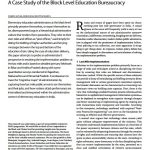
A social sector crusader
24 September 2017
The break in blogging was because I was confused.
My last two blogs were about my colleague in the IAS, V.J. Kurien, who is now Managing Director of the Cochin International Airport Limited. I had documented Kurien’s singular contribution to the project of building and running the international airport at Kochi, now considered to be the fourth busiest airport in India. I had intended, drawing from Kurien’s example, to tease out some general points on what constitutes an enabling environment for IAS officers to perform effectively.
However, the bigger picture did not form clearly in my mind. A critical piece of the puzzle seemed to be missing. Kurien works in the space of providing public infrastructure that is largely meant for the educated and those aspiring to climb up the economic and social ladder. An airport is not merely a place where aircraft land and you can board them; they are symbols of national resurgence. They make us proud; they make us believe that our country is progressing. They catch the public eye, they are written about, and a thousand selfies are shot with them in the background. It hit me in a flash; in order to flesh out thoughts on what makes IAS officers tick, I needed to find some who are successful in vastly different sectors than the one in which Kurien operates.
For all practical purposes, Vijay’s career, in spite of his passion and his professional excellence, seemed to be going the way of many before him; a pawn in the hands of an administration that was indifferent and cynical at best, and hostile at worst.
That is when I thought about T. Vijaykumar, a colleague, friend and mentor for three decades.
If one meet’s Vijay, he strikes you as an affable senior officer, more accessible than many of his ilk. He is quick to smile and even quicker to laugh; there is little of the dour, sanctimonious air that most officers carry when they advance in their careers, burdened with the weight of their responsibilities, real or assumed. He is not boastful; he does not bother you with countless stories of him waving the magic wand and transforming the world. But if one steps back and reflects upon Vijay’s career over three decades, there are few officers who have had such a direct impact on the lives of people as he has.
Vijay’s career went along a predictable path in the earlier years; his tenures as sub-Collector and Collector were standard ones, reserved for those belonging to the IAS. Yet, very early in his career, Vijay realised that his passions lay with working for the poor and the marginalised and that he was willing to pay the price for that. Assigned to the undivided State of Andhra Pradesh in 1983, Vijay’s early years were spent in poverty stricken tribal areas. However, he only spent a year in a tribal sub division, as sub-Collector of Paderu, in Visakhapatnam district, (October 1985 – September 1986), before he ran afoul of powerful interests that wanted to subvert his work on restoration of land rights to tribal people in accordance with the prevailing law.
Yet, his Paderu stint was a defining one for him; his passion to work to improve the lot of tribal people knew no bounds. On his insistence with senior bureaucrats, he was once again posted to a tribal area, this time as the Project Officer of the Integrated Tribal Development Agency, in East Godavari district. This post was not without drama; Vijay was one of several officers who were kidnapped and held for ransom by left wing extremists who threatened to kill him if some of their colleagues were not released from jails. In spite of Vijay’s excellent work with tribal communities, he did not last too long in the post of Project Officer either. A year, and another run in with vested interests who opposed his moves to enforce the law with respect to tribal land rights, was sufficient to ensure his hasty exit.
In the intervening periods between these postings in tribal areas, Vijay served in the Social Welfare Department, then as a Deputy Commissioner in the Excise department where he lasted four months, and as a special officer for land acquisition and rehabilitation in Vishakhapatnam, for a period of 9 months.
For all practical purposes, Vijay’s career, in spite of his passion and his professional excellence, seemed to be going the way of many before him; a pawn in the hands of an administration that was indifferent and cynical at best, and hostile at worst. Frequent postings did not prevent him from quickly taking up several initiatives, but it was optimistic to presume that these were going to be sustained when he left.
Vijay was a stone, rolling through the corridors and by lanes of the administration, gathering no moss.
Then, the Girijan Cooperative Corporation happened to Vijay; or was it the other way around? Did Vijay happen to the Girijan Cooperative Corporation?
This blog is part of a series on leadership in the Indian bureaucracy. The views expressed are of the author only.




